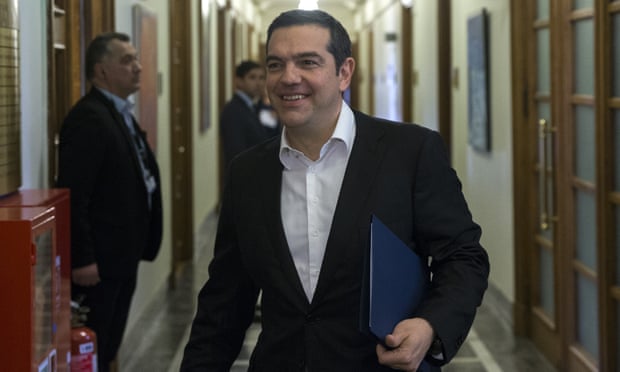Increase to €650 a month will stimulate the economy, says prime minister Alexis Tsipras
Greece’s prime minister, Alexis Tsipras, has announced the first increase in the country’s minimum wage in nearly a decade as his government took the first tangible step towards ending the austerity imposed during the euro crisis.
The leftist leader said the standard monthly minimum wage would rise by 11%, from €586 (£509) to €650, and a lower-wage category for younger employees would be abolished.
“[This] will be emblematic for the labour force, a rise that will reinvigorate the real economy,” Tsipras told a meeting of his cabinet.
The mimimum wage freeze had become symbolic of the inequities of belt-tightening as Greece weathered its worst economic storm in modern times. The increase, while expected, was greater than anticipated: there had been speculation that it would rise by 8% to €630.
Tsipras, who faces general elections later this year and is lagging in polls, is determined to reverse some of the unpopular measures Athens has been compelled to take by the creditors behind the bailouts that have kept Greece afloat for the past nine years.
After receiving the biggest financial rescue in global economic history, the country exited its third and final EU-sponsored bailout programme last August.
The planned wage increases were agreed in consultation with EU lenders still monitoring Athens’ fiscal progress and must be approved by parliament to take effect in February as the government hopes.
An estimated 880,000 people will benefit from the changes, according to the labour ministry, which said unemployment pay and maternity support would also rise. One in three Greeks in the private sector earn less than €600 a month.
The increase comes seven years after Greece was forced to slash the standard minimum wage by 22% to €586. Labour market reforms aimed at making the nation more competitive were felt especially by Greeks under the age of 25.
Under the steely watch of creditors, Greece last year outperformed budget targets, but while unemployment has dropped by almost 10 percentage points to 18.1%, the economic recovery remains fragile.
Hobbled by the highest debt-to-GDP ratio in Europe, the country’s banking system has the largest stock of non-performing loans of any EU member state, making it particularly vulnerable to global market instability.
A glimmer of light emerged on Monday as borrowing costs on 10-year bonds dropped to a four–month low and Tsipras announced that the government would imminently be issuing a five-year bond.

